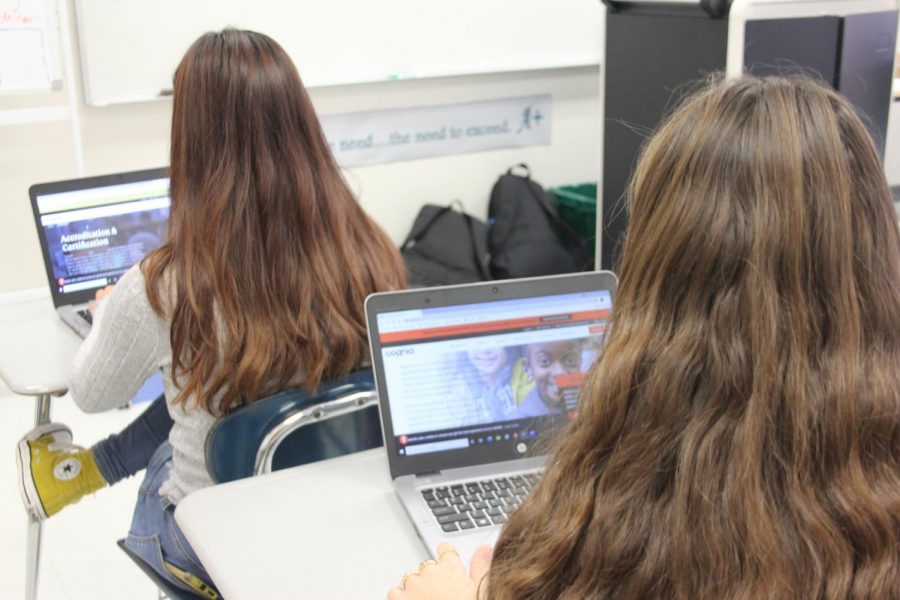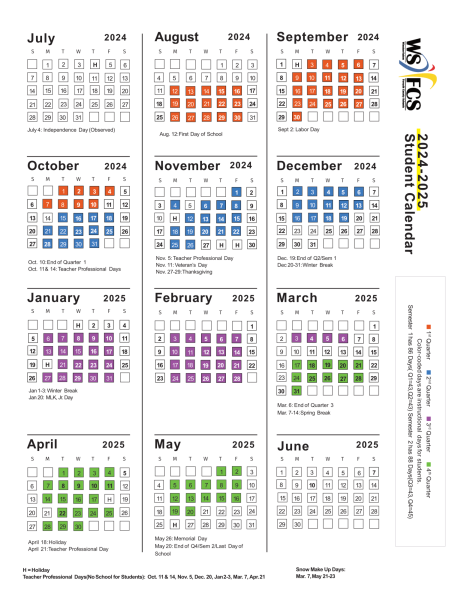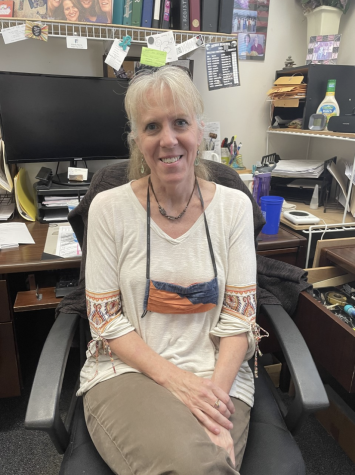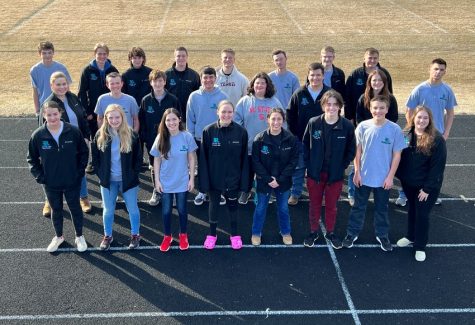Reagan partners with Cognia for their next accreditation
Sophmores Eliza Gifford and Ilia Young view the Cognia website. The Cognia organization is conducting Reagan’s current accreditation.
“Do you feel supported at school? What kind of work do you do the most? Do you participate in class?”
Those are the types of questions included in the surveys that the Reagan student body has taken recently. The data collected from these surveys goes towards the school’s accreditation, which is important not only for the school itself but also for all the students currently working towards graduating and continuing on to higher education.
“[Accreditation] means that your diploma will have value outside of this school,” said Assistant Principal Brent Atkinson. “It’s an outside agency that looks to make sure that we are doing everything we should be doing to meet high school standards.”
Atkinson has been working and coordinating our school’s current accreditation process.
“The accreditation process is how we prove that we are doing all the things we are supposed to be doing to make your diploma have value,” he said.
Cognia, a non-profit organization, conducts most accreditations in the southeastern part of the country, which includes Reagan.
School districts have the option to decide how accreditation within their district will work: either their district as a whole will go through the process, or every individual school will be required to go through the process. The Winston-Salem Forsyth County School district chooses to require all schools to get accredited.
A school’s accreditation is due for renewal every five years, but this time the renewal process was extended because of COVID-19. The process will be completely virtual this year.
“Normally they [Cognia] would come and there would be a group, a team of people, who would spend three days in our school,” Atkinson said. “That won’t happen this year.”
Instead, Cognia is finding other ways to get the information they need. For example, Cognia may take a handful of students from the roster and ask to speak with them over Zoom. This panel is in place of Cognia employees pulling students into the hallway and asking them questions about their school.
Students at Reagan have been contributing thus far by taking surveys sent to their student email. The data from these surveys is collected and all goes towards the accreditation process.
“We are reviewing all of that data from those surveys, and we are presenting it to them,” Atkinson said. “We also present all of our testing and school performance data, like how we do on EOCs and how we do on ACTs. All that sort of stuff.”
Additionally, documents such as the student handbook and district board policies are sent to Cognia.
When students are taking these surveys, they should keep in mind that honest, thoughtful feedback is needed, not just random clicks.
“We don’t want to try and say that everything is peachy and great,” Atkinson said. “We want to be able to address when there is some sort of issue that does pop up”. Students should be truthful with their responses on the questions on the surveys because not only does the data need to be accurate, but administrators need to be able to fix whatever issues student see within the school.
All responses are anonymous, so students should not worry about their responses being connected to them.
Once Cognia receives all of Reagan’s data and information, “They will take all these documents we do, like our school improvement plan, they will take our results from our surveys, our score data, and then they run it through their review system,” Atkinson said.
Their review process is thorough, so results will not come back until next semester. “They’ll [Cognia] come in, this time virtually…and give us a report. And then they’ll just go away and we will have our things that we have to work on and follow up on from that report,” Atkinson said.
There are, in simplest terms, three tiers of what can happen.
“You can just be fully accredited, basically saying ‘Yep, you’re doing all the things you are supposed to and required to do to have a valid educational program,” Atkinson said. Even if a school receives full accreditation, the school will still receive a report on certain things your school should improve upon.
In the next tier, “you could get accredited with… stipulations. Basically, they’ll say ‘We’re going to give you two to three years to start [doing] these things, and you’re gonna have to prove to us that you’re doing them,’” Atkinson said.
In this scenario, a school will not receive the full accreditation, but you will still receive a list of things your school needs to approve upon. Within a set time period, your school must improve upon what Cognia says, and only then might your school receive accreditation.
“And of course there is…if you are in trouble and have already been through the process and not made those couple steps, they’ll just not accreditate you,” Atkinson said. “Which would virtually mean that all of a sudden our diplomas wouldn’t have value. That’s the worst-case scenario and it can’t happen overnight.” Atkinson assures that this won’t happen to Reagan.
As stated above, a school not receiving accreditation does affect the students wishing to continue their education at a college.
“If we aren’t accredited, you couldn’t go to UNC-Chapel Hill. You couldn’t go to ECU. None of those schools would recognize our high school diploma as a legitimate piece of paper,” Atkinson said.
However, Atkinson does explain that public and private colleges do differ when accounting for high school accreditation.
“Private schools, like Wake, have the ability to recognize whatever they want. They can make their own rules and their own choices… It would be very unlikely for them to recognize a diploma from an unaccredited school,” Atkinson said.
Almost definitely, Reagan will receive accreditation. It is highly unlikely that Reagan would not get accredited, so there is no need to worry.
Once a school is accredited, the time between that accreditation and the next will be spent improving upon whatever Cognia tells the school that they should do. Atkinson makes clear that constructive criticisms are taken seriously and dealt with a high importance here at Reagan.
“A huge part of what this is for is so that us as a school can take any criticism they provide to us and say ‘do we have opportunities to make it [Reagan] a better place?’ If they [Cognia] come back and they say there is entirely too much teacher-led instruction happening in classrooms, then we have to reflect on that and say ‘what is the path to making it a more engaging and interactive environment?’” Atkinson said.
Since Reagan’s last accreditation, many changes have occurred in Reagan’s administration. Principal Brad Royal and many other administrative staff members have joined Reagan in the time since the last accreditation, so the last time the school received feedback from Cognia these staff members were not here yet. Within their time here at Reagan, Royal and the rest of the administration have implemented several changes that will be reflected in the school’s data.
By participating in and providing truthful information for the surveys that students take, students are supporting Reagan’s path to accreditation. The student body’s help in accreditation will ensure that transcripts from Reagan are valid, so though it may not be mentioned often, it is definitely an important process.
Your donation will support the student journalists of Ronald Reagan High School - NC. Your contribution will allow us to purchase equipment and cover our annual website hosting costs.






